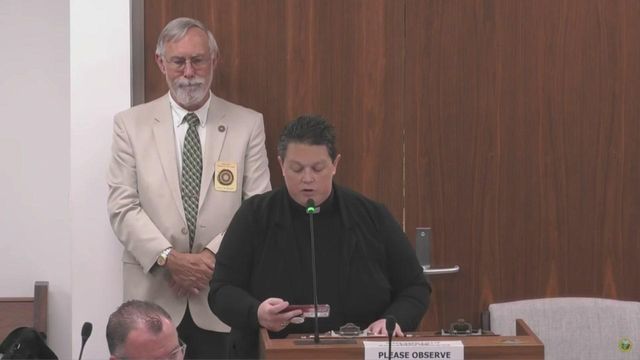Editorial: Hyper-partisan high court shatters trust in N.C.'s judicial system

CBC Editorial: Thursday, Sept. 7, 2023; editorial #8871
The following is the opinion of Capitol Broadcasting Company
Justice and the law appear to be taking a back seat to partisan politics on the North Carolina Supreme Court.
Regrettably, two recent judicial matters offer further evidence that the state’s appellate courts are running off the rails since 2016 when the legislature reverted to partisan judicial elections.
This is no casual observation. Two recent examples:
- The federal lawsuit filed by Justice Anita Earls, contending the State Judicial Standards Commission initiated a politically-motivated investigation into statements she made concerning race and gender diversity in the state courts system was aimed at suppressing her First Amendment rights.
- A sarcastic and personal attack, in a recently issued state Supreme Court order, from Republican Justice Richard Dietz who is white on a dissent authored by Earls, a Democrat who is Black.
Earls’ federal lawsuit was filed Aug. 29. A day later, the order – including the dissent from Earls and Dietz’s reply to that dissent, was filed.
These two matters – Earls’ federal lawsuit and a Deitz’s pointed and personal exchange in the court order coming so close together – lifted the heavy curtain that typically hides the details and nuance of the court’s deliberations and relationships. We vividly see now just the bitter divisiveness and animosity on the state’s high court since Republican Paul Newby became chief justice in 2020 with his 401-vote election victory (0.007% of the 5.4 million votes cast) over former Chief Justice Cheri Beasley, a Democrat who is also Black.
In the federal court filing, Earls said: “The First Amendment provides me and every American the right to free speech and to bring to light imperfections and unfairness in our political and judicial systems. I believe that public confidence in the judiciary is best promoted by honestly looking at the facts, not by sweeping the truth under the rug or silencing dissenters.”
The next day’s N.C. Supreme Court order, in a “concurring” statement Dietz focused more on attacking Earls than on defending the high court’s action. He referred directly to his “dissenting colleague” and described her “angry rhetoric” that “read more like pulp fiction” and was “unhinged.” Dietz made no reference to dissents by other justice Republican Phil Berger Jr. or Democrat Michael Morgan. Dietz’s comments, in their entirety, are reproduced below. The entire order is available here.
Dietz even implies that Earls lied in her comments when she said: “We have not heard oral arguments. We have not deliberated as a body on the legal issues. And we have not written or exchanged opinions on whether the Court of Appeals was correct.”
By contrast, Dietz said: “My dissenting colleague did not agree with the outcome of the Court’s deliberations and therefore discredits them. But that does not mean they never occurred.”
While they may have exchanged their views on the specific order issued, there is no evidence that there were any oral arguments before the state’s high court, or that there were any deliberations by the justices nor evidence of circulation of opinions on the validity of the Court of Appeals ruling in the case.
Of far more significance, with these two matters the high court’s revealed its dirty laundry. As the case in federal court progresses, there’s likely to be more revealed as judicial discovery may require revelation of the Judicial Standards Commission’s otherwise secret communications, deliberations and records.
While there will always be differences of opinion – sometimes even deep and sharp – over the legal issues our appellate courts are called upon to adjudicate citizens should be assured they are about the law and not politics.
We continue to learn what a mistake it was for North Carolina to abandon non-partisan election of judges. The latest cases are vivid examples.
Trust in our judicial system is fragile and the damage already being done will take time and work to restore it. An important step would be to remove partisanship in the selection of our judges and justices.
While the legislature continues to ponder elections changes, it should make a return to nonpartisan judicial elections a top priority now.
Capitol Broadcasting Company's Opinion Section seeks a broad range of comments and letters to the editor. Our Comments beside each opinion column offer the opportunity to engage in a dialogue about this article.
In addition, we invite you to write a letter to the editor about this or any other opinion articles. Here are some tips on submissions >> SUBMIT A LETTER TO THE EDITOR
* * *
Justice (RICHARD) DIETZ concurring.
Once again, this Court enters a routine order that draws an exaggerated, hyperbolic dissent from one of my colleagues. See post (Earls, J., dissenting). And, as is the case with so many of my colleague’s dissents, one could be forgiven for thinking that doom is upon us.
My colleague accuses the majority of seeking “power” over reason, of engaging in a “radically destabilizing shift,” of attempting to “brazenly warp the law,” and on and on. Like so many of my colleague’s dissents, this one has portions that read more like pulp fiction than a legal opinion.
Lawyers and judges are trained to push past empty rhetoric and weigh the strength of an argument on its merits. It is worth doing so here because reasonable jurists can disagree about how best to resolve this case. But that hardly means—as my dissenting colleague suggests—that “the integrity of our justice system” is now in question.
As an initial matter, our actions today are consistent with precedent. This Court has expressly held that when an appeal becomes moot while at this Court, we retain the power to vacate the lower court decision when we dismiss the appeal. State ex rel. Utils. Comm’n v. S. Bell Tel. & Tel. Co., 289 N.C. 286, 290 (1976).
The concern this Court identified almost 50 years ago in Southern Bell is the same one at issue here. As the Court explained, “When a case becomes moot while on appeal, the usual disposition is simply to dismiss the appeal. This procedure, however, leaves the decision of the Court of Appeals undisturbed as a precedent when, but for intervening mootness, it might not have remained so.” Id. (citation omitted). Thus, in Southern Bell, this Court chose to vacate the Court of Appeals decision so that it was not binding on the lower courts: “While we express no opinion as to its correctness, the better practice in this circumstance is to vacate the decision of the Court of Appeals.” Id.
Our precedent also is far from unique. Federal appellate courts routinely vacate lower court orders when the parties reach a joint settlement or otherwise moot an appeal. As the U.S. Court of Appeals for the Federal Circuit once explained, “vacatur of the judgment at trial is appropriate when settlement moots the action on appeal.” U.S. Philips Corp. v. Windmere Corp., 971 F.2d 728, 731 (Fed. Cir. 1992).
Finally, the Court’s order in this case serves our state’s jurisprudence. We allowed discretionary review here because the appeal raises questions significant to our jurisprudence and to the public interest. See N.C.G.S. § 7A-31 (2021). In particular, as the parties’ briefing acknowledged, the Court of Appeals opinion may have unintentionally changed the law and put our state at odds with our sister states and with widely accepted doctrine found in the Restatement of Torts.
We are quite familiar with the issues presented. We spent months reviewing the parties’ submissions before deciding to take up the case, and then we spent months more reviewing the parties’ merits briefing ahead of the scheduled oral argument in just over two months. Most importantly—and contrary to the dissent’s assertions—we have deliberated “as a body” on the merits of this case, on the consequences of the legal issues presented, and on how best to resolve this appeal. As is often the case, my dissenting colleague did not agree with the outcome of the Court’s deliberations and therefore discredits them. But that does not mean they never occurred.
Moreover, given the importance of the legal issues presented, vacating the lower court decision is certainly preferable to the alternative—which is to keep the case because of its importance to our state’s law and to force the parties to continue litigating it. See, e.g., N.C. State Bar v. Randolph, 325 N.C. 699, 701 (1989). This, too, is far from unprecedented. As recently as last year, this Court denied a request to voluntarily dismiss an appeal—thus forcing parties to continue litigating a case unwillingly—because of the importance of the issues involved. See Harper v. Hall, 383 N.C. 89, 114 (2022), opinion withdrawn and superseded on other grounds on reh’g, 384 N.C. 292 (2023).
Rather than force the parties here to endure further, costly litigation, we chose—after much debate—to vacate the lower court opinion, as we did in Southern Bell. This permits the Court of Appeals to refine its holding in future cases and perhaps avoid the issues that led us to review this case in the first place. One can reasonably disagree with our approach, but to claim that our decision comes “at the cost of the integrity of our justice system and our citizens’ faith in it” is a bit unhinged.
The dissent also argues that vacating the Court of Appeals decision is “contrary to law.” This is so, the dissent reasons, because the Rules of Appellate Procedure state that a published Court of Appeals opinion “remains binding precedent unless reversed by this Court.”
But that language has never meant that a strict “reversal” following oral argument is the only means of overturning lower court precedent. This Court routinely disavows or vacates Court of Appeals precedent without the need for oral argument and without a formal ruling “reversing” it. Doing so is part of our constitutional role in supervising the decisions of the lower courts. See, e.g., State v. Ledbetter, 372 N.C. 692 (2019) (denying petition for discretionary review but holding that the Court “disavows the language in the last paragraph of the Court of Appeals’s decision”); State v. Ore, 383 N.C. 676 (2022) (summarily vacating Court of Appeals decision based solely on petition for discretionary review and response).
In sum, there is nothing earth-shattering about the Court’s straightforward order in this case. As I said, reasonable jurists can disagree about how to resolve this case. I think it is fair, if one ends up on the losing end of that disagreement, to write separately and present an opposing legal view in a dissent. Two of my colleagues have done that in thoughtful dissents. See post (Morgan, J., dissenting and Berger, J., dissenting). But that is not what my other dissenting colleague has done. I write separately to emphasize that the reasonable differences of opinion that are present in this case do not warrant my dissenting colleague’s angry rhetoric; the needless, toxic disparagement; and the worn-out insistence that every routine disagreement at this Court portends the end of the public’s faith in our justice system.









